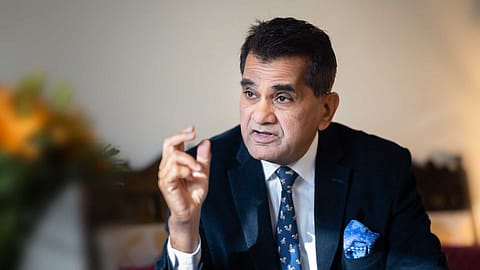Amitabh Kant calls for making 2-wheelers, 3-wheelers sales 100% electric by 2028
He was speaking at the 'National Dialogue on Emerging Trends in E-Mobility,' organised today by the Council on Energy, Environment and Water (CEEW) in New Delhi.

Amitabh Kant, G20 Sherpa of India, on Monday said India should target making the sales of two-wheelers and three-wheelers to be 100% electric in the next five years. He was speaking at the 'National Dialogue on Emerging Trends in E-Mobility,' organised today by the Council on Energy, Environment and Water (CEEW) in New Delhi.
"India should target making two and three-wheelers sales 100% electric in the next five years. This will not only help reduce air pollution but also ensure that we become a global manufacturing champion for electric two-wheelers and three-wheelers. Public mobility is the backbone of a civilised society. Focus should also be on e-buses," Kant said.
"To accelerate the e-mobility transition, financing will be the key. There is a need for mechanisms such as first-loss guarantees, credit enhancement, and blended finance, to enable private-capital flow at scale. We must target to install five million fast chargers, and push for battery swapping and production-linked incentives (PLIs) schemes for localized manufacturing," he added.
During the event, he also released CEEW Centre for Energy Finance’s (CEEW-CEF) independent report. Titled ‘Greening India’s Automotive Sector, the report said that more electric vehicles (EVs) were sold in the country in the first six months of FY 2022-23 than in the previous full financial year.
The CEEW-CEF report found that e-two-wheelers and e-rickshaws jointly lead the EV segment in India, forming 93.5% of the total market. In the first six months of FY2022-23, nearly three lakh e-two-wheelers and 1.7 lakh e-rickshaws were sold, the highest-ever recorded for both. However, despite such high numbers, the penetration of EVs among all two-wheelers remains low at only 4%.
The report found states with EV policies incorporating consumer incentives saw 2X market growth compared to states without such incentives. "This segment, which sold less than 3,000 vehicles in FY 2013-14, has now sold approximately 500,000 units in the first six months of FY 2022-23 alone," the report said.
"Electric vehicles comprised 2.6% of the country’s total auto sales in FY 2021-22. However, these are penetration numbers the segment has long overshot since EVs formed 6% of India’s monthly auto sales in September 2022. The average EV penetration for the first six months of FY 2022-23 stood at 4.9%," it added.
Recommended Stories
According to the report, states with higher incentives such as Assam, Goa, and Gujarat registered a nearly 20X growth in the six-month period after the notification of their incentive policies. On the other hand, states with lower incentives saw their markets grow by only 4.5X. In FY2021-22 and the first six months of FY2022-23, the report found that Uttar Pradesh leads as the state with the highest EV sales by 4% at 1.65 lakh units. This was followed by Maharashtra with 1.12 lakh electric vehicle sales.
However, Delhi has India’s highest EV penetration at 8.30%, followed by Assam at 5.91%. Among RTOs, Pune leads in absolute sales with 21,665 EVs sold in FY 2021-22 and the first six months of FY 2022-23.
"India's EV segment has been a bright spot for the auto sector — and growing from strength to strength. We are well-positioned to emerge as a global manufacturing hub for electric two- and three-wheelers. Announcing an official EV transition target for India's auto sector could provide further impetus to the sector's growth, both nationally as well as sub-nationally. In fact, states must also give incentives to vehicle categories more suited for electrification. The successful greening of India’s auto sector could be a shining example of a transition that generates jobs and spurs economic growth in a just and sustainable manner," said Dr Arunabha Ghosh, CEO, CEEW.